Fast Facts
- When: 20th November to 18th December 2022
- Where: Qatar
- Watch: BBC & ITV
- Official Website: FIFA World Cup
The World Cup is arguably the biggest sporting event on the planet. In fact, baring the Olympics, no event really gets near the World Cup in terms of a global audience, with viewing figures of over three billion reported for the last tournament. It’s run by FIFA, the governing body for world football and is their flagship tournament.
Prior to the 2014 World Cup in Brazil, the European countries would tend to dominate when held on their home continent. Similarly, South American countries would fare better when held in the Americas. Germany upset that apple cart however, lifting the famous FIFA World Cup Trophy in Rio de Janeiro. Europe was again on top in 2018 when France were victorious in Moscow.
Excitement will no doubt reach fever pitch by the time Qatar 2022 kicks off on November 20th, the first World Cup played during our winter. The best players on the planet will be in attendance, but who will be ultimately victorious in Lusail?
Existing Customer Free Bets & Money Back Offers
Please Note: This event has now ended.
Stats Articles
- What is the Average Number of Penalties in a Football Match?
- Which Continent Has Won the Most World Cups?
- Has Any Player Won the World Cup Golden Boot More Than Once?
- How Many Players Have Won the World Cup Golden Ball More Than Once?
- How Often Does the Favourite Win the World Cup?
- Has Any Team Won Back-To-Back FIFA World Cups?
- How Often Has the Reigning Winner of the Euros Won the World Cup?
- How Often Have the Reigning FIFA World Cup Winners Won The Euros?
- How Many Times Have The Hosts Won The World Cup?
About the 2022 World Cup in Qatar
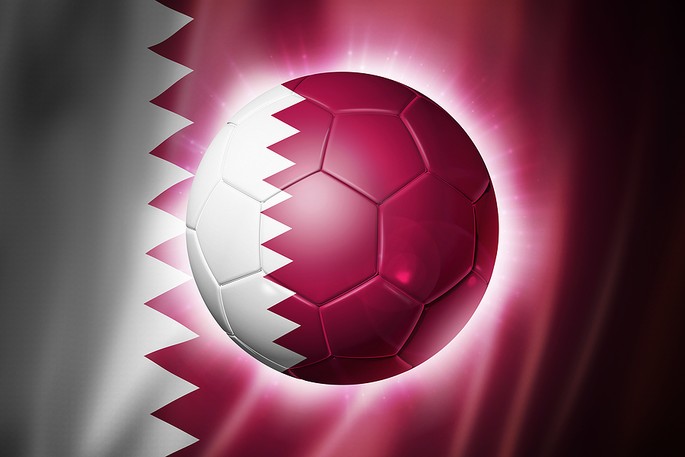
The 2022 World Cup in Qatar will be the first World Cup to take place during the northern hemisphere’s Winter. It will begin on Sunday 2oth November, with the final taking place on Sunday 18th December. This is only the second time the tournament has been held in Asia and the third time the finals have been held outside of Europe and the Americas.
Already a controversial World Cup, the move to the winter was made due to the high temperatures that players and fans would have had to endure in the Persian Gulf during the summer months.
Schedule
- Qualifying – June 2019 to June 2022
- Group Games – Sunday 20th November to Friday 2nd December 2022
- Round of 16 – Saturday 3rd to Tuesday 6th December 2022
- Quarter-Finals – Friday 9th & Saturday 10th December 2022
- Semi-Finals – Tuesday 13th & Wednesday 14th December 2022
- Third Place Play-Off – Saturday 17th December 2022
- Final – Sunday 18th December 2022
The Groups
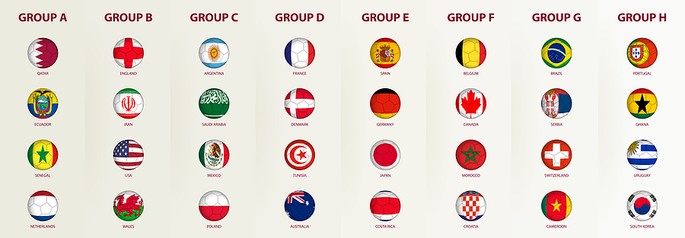
In Qatar, there will be eight groups of four teams, named groups A to H. Each team will play each other once, with the top two teams in the group progressing to the round of 16. If teams are level on points, their position will be decided on goals difference. If this is also tied the teams will be split by goals scored, then the head to head record of the teams in question followed by the respective disciplinary records.
For the draw, teams were split in four pots, seeds 1 to 4. Seedings were based on the FIFA World Rankings of the qualified teams with the exceptions of the host nation Qatar, who were placed in pot 1 as a top seed, and the three teams qualifying via the playoffs who were placed in pot 4. One team was drawn from each of the four pots to make up the eight groups.
All eight groups are shown in detail below. The odds shown are a guide only, FIFA rankings are correct as of September 2022.
Group A Betting Guide
| Seed | Country | FIFA Ranking | World Cup Outright | Group Winner | To Qualify |
|---|---|---|---|---|---|
| 1 | Qatar | 48 | 250/1 | 12/1 | 11/2 |
| 2 | Netherlands | 8 | 12/1 | 2/5 | 1/8 |
| 3 | Senegal | 18 | 66/1 | 9/2 | 8/11 |
| 4 | Ecuador | 44 | 150/1 | Evens | 11/10 |
Tournament hosts Qatar are the top seeds in Group A, this is the first World Cup Finals that they have played in. Group favourites are the Netherlands who were runners-up in 1974, 1978 and 2010. They failed to qualify for Russia 2018 but reached the semi-finals in 2014, finishing in third place.
Senegal have only qualified for two previous finals. Their best performance was reaching the quarter-finals in 2002. At the 2018 tournament Senegal were eliminated in the group stage but only on fair play points after finishing level with Japan. Ecuador reached the World Cup Finals in 2002, 2006 and 2014. They were eliminated during the group phase in 2002 and 2014 but reached the round of 16 in 2006, knocked out by England after David Beckham scored form a free kick in the only goal of the game.
Group B Betting Guide
| Seed | Country | FIFA Ranking | World Cup Outright | Group Winner | To Qualify |
|---|---|---|---|---|---|
| 1 | England | 5 | 6/1 | 1/3 | 1/16 |
| 2 | United States | 14 | 100/1 | 11/2 | 11/10 |
| 3 | Iran | 22 | 500/1 | 20/1 | 4/1 |
| 4 | Wales | 19 | 150/1 | 5/1 | 11/10 |
England are the favourites to win Group B. They won the World Cup back in 1966 and are ranked fifth in the world. They reached the semi-finals in 2018 and 1990 but on both occasions they lost the subsequent third place playoff.
The second seeds are the United States, who didn’t reach the finals in 2018 but made seven successive tournaments between 1990 and 2014. their best performance to date was reaching the quarter finals in 2002 where they were beaten by eventual finalists Germany after defeating Mexico in the Round of 16.
Wales qualified for the finals for the first time since 1958 when they reached the quarter-finals, defeated 1-0 Brazil. Iran have never progressed passed the first phase of the finals but have qualified five times – in 1978, 1998, 2006, 2014 and 2018. In 2018 they won their opening game against Morocco and lost narrowly to Spain 1-0 before drawing their third match against Portugal thanks to an injury time penalty.
Group C Betting Guide
| Seed | Country | FIFA Ranking | World Cup Outright | Group Winner | To Qualify |
|---|---|---|---|---|---|
| 1 | Argentina | 3 | 7/1 | 2/5 | 1/16 |
| 2 | Mexico | 12 | 150/1 | 9/2 | 10/11 |
| 3 | Poland | 26 | 125/1 | 9/2 | 10/11 |
| 4 | Saudi Arabia | 53 | 500/1 | 25/1 | 6/1 |
The third ranked team in the world, Argentina, are the Group C top seeds. They have only missed one tournament since 1958 and won the World Cup in 1978 and 1986. In 2018 Argentina progressed as group runners-up after drawing with Iceland, losing to Croatia before beating Nigeria. In the round of 16 they were eliminated after a 7-goal thriller against France who would go on to lift the trophy.
Second seeds Mexico reached the quarter-finals in 1970 and 1986 but have never made the last four. They have qualified for every tournament since 1994 and in each of those finals they progressed through the group stage only to be eliminated at the first knockout phase.
Third seeds Poland have made the semi-finals twice, winning the third-place playoffs in both 1974 and 1982. Since 1990 they have made three other appearances at World Cup Finals but were eliminated at the group stage for each. Saudi Arabia may be one of the outsiders of the whole tournament but they did reach the round of 16 in 1994 and have reached four other tournaments since.
Group D Betting Guide
| Seed | Country | FIFA Ranking | World Cup Outright | Group Winner | To Qualify |
|---|---|---|---|---|---|
| 1 | France | 4 | 11/2 | 2/5 | 1/14 |
| 2 | Denmark | 10 | 28/1 | 11/4 | 2/5 |
| 3 | Tunisia | 30 | 400/1 | 16/1 | 3/1 |
| 4 | Australia | 39 | 400/1 | 20/1 | 4/1 |
Two-time winners France are the Group D top seeds and reigning World Champions after victory in Russia 2018. Their other win came when hosting the tournament in 1998. France were runners-up against Italy in 2006 but were eliminated in the group stages of the 2002 and 2010 tournaments.
Euro 2020 semi-finalists Denmark are the next favourites to qualify. Their best performance at a World Cup to date is reaching the quarter-finals at France ’98. They also made the knockout stages in 1986, 2002 and 2018. In 2018, they made the round of 16 after a win and two draws in the group stage. They were eliminated on penalties in the next round however, losing out to eventual runners-up Croatia.
Third ranked Tunisia are ranked 30th in the world. They have never progressed passed the group stage but have played in five previous finals – 1978, 1998, 2002, 2006 and 2018. Fourth seeds Australia qualified after defeating Peru in a playoff. They reached the round of 16 in 2006, and have qualified for every tournament since then.
Group E Betting Guide
| Seed | Country | FIFA Ranking | World Cup Outright | Group Winner | To Qualify |
|---|---|---|---|---|---|
| 1 | Spain | 6 | 8/1 | 10/11 | 1/14 |
| 2 | Germany | 11 | 10/1 | 11/10 | 1/10 |
| 3 | Japan | 24 | 250/1 | 12/1 | 5/2 |
| 4 | Costa Rica | 34 | 750/1 | 40/1 | 12/1 |
Germany are 4-time World Champions, lifting the trophy in 1954, 1974, 1990 and most recently in Brazil 2014. In 2018 however, the defending champions were dumped out of the competition at the group stage, finishing bottom after defeats to Mexico and South Korea.
Spain were champions in South Africa in 2010 but despite their rich footballing heritage, outside of this tournament they have never progresses past the quarter-final stage. In 2018, they were eliminated in the round of 16 on penalties by the hosts Russia.
Japan’s best performances came in 2002, 2010 and 2018 where they reached the round of 16, whilst rank outsiders Costa Rica famously got to the quarter-finals of the 2014 World Cup, only losing on penalties to the Netherlands.
Group F Betting Guide
| Seed | Country | FIFA Ranking | World Cup Outright | Group Winner | To Qualify |
|---|---|---|---|---|---|
| 1 | Belgium | 2 | 14/1 | 1/2 | 1/9 |
| 2 | Croatia | 15 | 50/1 | 5/2 | 4/7 |
| 3 | Morocco | 23 | 200/1 | 11/1 | 9/4 |
| 4 | Canada | 43 | 200/1 | 11/1 | 5/2 |
Belgium have been amongst the favourites for recent major tournament but they are yet to reach a World Cup Final. They finished third in 2018, losing to France in the semi-finals and defeating England in the playoff. They were also fourth in Mexico ’86.
Croatia’s first World Cup as an independent nation was France 1998 when they finished in third place. They were also runners-up at the most recent tournament in 2018. On both occasions they were defeated by France.
Morocco are playing in their sixth finals, they produced a tournament best record when reaching the round of 16 in 1986. Canada are playing in just their second finals. Their only previous appearance was in Mexico 1986 where they lost all three group games against France, Hungary and the Soviet Union.
Group G Betting Guide
| Seed | Country | FIFA Ranking | World Cup Outright | Group Winner | To Qualify |
|---|---|---|---|---|---|
| 1 | Brazil | 1 | 9/2 | 1/3 | 1/16 |
| 2 | Switzerland | 16 | 80/1 | 5/1 | 10/11 |
| 3 | Serbia | 25 | 150/1 | 7/1 | 6/5 |
| 4 | Cameroon | 38 | 200/1 | 14/1 | 11/4 |
Tournament favourites Brazil have lifted the World Cup on five occasions, more than any other nation. Their last win however was back in 2002, having also been champions in 1994, 1970, 1962 and 1958. They have qualified for every World Cup, only failing to progress from the group stages in 1930 and 1966.
The Swiss are rarely fancied to reach the latter stages of the World Cup but they have qualified for their fifth successive finals. Switzerland’s best performances have been to reach the quarter-finals in 1934, 1938 and 1954. They progressed from the group stage only to be eliminated in the round of 16 in both 2014 and 2018.
Serbia and Montenegro qualified for the 2006 World Cup, making the finals of the 2010 and 2018 tournaments as an independent Serbia. In all three tournaments they exited at the group stage. Cameroon made it all the way to the quarter-finals of Italia ’90, narrowly losing to England. They have made six other finals but didn’t make the knockout rounds in those tournaments.
Group H Betting Guide
| Seed | Country | FIFA Ranking | World Cup Outright | Group Winner | To Qualify |
|---|---|---|---|---|---|
| 1 | Portugal | 9 | 12/1 | 4/6 | 1/10 |
| 2 | Uruguay | 13 | 50/1 | 2/1 | 2/5 |
| 3 | South Korea | 28 | 250/1 | 11/1 | 13/5 |
| 4 | Ghana | 60 | 250/1 | 11/1 | 5/2 |
Portugal are the top seeds in a close looking Group H. Portugal were third in 1966 and fourth in 2006. Surprisingly, this is only their eighth finals. At Russia 2018, Portugal were eliminated by Uruguay in the round of 16.
Uruguay won the inaugural World Cup, which they hosted in 1930. Twenty years later they again lifted the trophy at Brazil 1950. In the previous World Cup in 2018, they were eliminated in the quarter-finals by eventually Champions France.
South Korea’s best World Cup performance came when reaching the semi-finals of the 2002 tournament which they co-hosted. They have qualified for every tournament since 1986 but outside of 2002, they have only progressed passed the group stages once, reaching the round of 16 on 2010. Ghana are playing in just their fourth finals and their first since 2014. Their best performance came in 2010 when reaching the quarter-finals in South Africa.
Stadium Guide

Eight stadiums will be used for the 2022 World Cup, all within a 40km radius from central Doha. Six of the eight stadiums were constructed specifically for the 2022 World Cup. The Khalifa International Stadium was originally opened in 1976 but has been renovated for the tournament. The Ahmad bin Ali Stadium was opened in 2003 but was completely rebuilt between 2016 and 2020.
The largest stadium is the Lusail Iconic Stadium which has a capacity of 80,000. This was designed by Norman Foster who was also responsible for the new Wembley Stadium. This was opened in 2021 and has been reported to have cost almost $800 million to construct. The Lusail Iconic Stadium will hold ten matches in total, including the World Cup Final.
World Cup 2022 Stadiums and Matches
| Stadium | Capacity | Matches | Group | R16 | Quarters | Semis | Final |
|---|---|---|---|---|---|---|---|
| Lusail Iconic | 80,000 | 10 | 6 (C,G,H) | ✅ | ✅ | ✅ | ✅ |
| Al-Bayt | 60,000 | 9 | 6 (A,B,E,F) | ✅ | ✅ | ✅ | ✖ |
| Education City | 45,350 | 8 | 6 (C,D,H) | ✅ | ✅ | ✖ | ✖ |
| Al Thumama | 40,000 | 8 | 6 (A,B,E,F) | ✅ | ✅ | ✖ | ✖ |
| Khalifa International* | 45,416 | 8 | 6 (A,B,E,F) | ✅ | ✖ | ✖ | ✖ |
| Ahmad bin Ali | 44,740 | 7 | 6 (B,E,F) | ✅ | ✖ | ✖ | ✖ |
| Stadium 974 | 40,000 | 7 | 6 (C,D,G,H) | ✅ | ✖ | ✖ | ✖ |
| Al Janoub | 40,000 | 7 | 6 (D,G,H) | ✅ | ✖ | ✖ | ✖ |
*The Khalifa International will also hold the third place playoff
The Players
With the odd exceptions such as Erling Haaland and Mohamed Salah, the best players on the planet will be assembled in Qatar for the World Cup. The ultimate prize for any footballer would be a World Cup winners medal, however from a betting perspective there are also some interesting individual markets for the tournament.
The most popular player market at any major finals is the top goalscorer. The player who nets the most goals is awarded the Golden Boot but be careful which specific market you are betting on – the top goalscorer can be tied, with dead heat rules applying whereas the official Golden Boot has tie breakers such as assists and goals per minute played.
Below we have a guide on the key players to look out for when considering the top goalscorer for the 2022 tournament.
World Cup 2022 Top Goalscorer Betting – Top 20 Players
| Player | Country | Odds | Age | Caps | International Goals |
|---|---|---|---|---|---|
| Harry Kane | England | 7/1 | 29 | 73 | 50 |
| Kylian Mbappe | France | 9/1 | 23 | 57 | 27 |
| Karim Benzema | France | 12/1 | 34 | 97 | 37 |
| Cristiano Ronaldo | Portugal | 16/1 | 37 | 189 | 117 |
| Lionel Messi | Argentina | 16/1 | 35 | 162 | 86 |
| Neymar | Brazil | 20/1 | 30 | 119 | 74 |
| Memphis Depay | Netherlands | 20/1 | 28 | 80 | 42 |
| Romelu Lukaku | Belgium | 20/1 | 29 | 102 | 68 |
| Diogo Jota | Portugal | 33/1 | 25 | 27 | 9 |
| Antoine Griezmann | France | 33/1 | 31 | 108 | 42 |
| Kai Havertz | Germany | 33/1 | 23 | 28 | 8 |
| Gabriel Jesus | Brazil | 33/1 | 25 | 56 | 19 |
| Lautaro Martinez | Argentina | 33/1 | 25 | 38 | 20 |
| Vinicius Junior | Brazil | 33/1 | 22 | 14 | 1 |
| Serge Gnabry | Germany | 40/1 | 27 | 34 | 20 |
| Robert Lewandowski | Poland | 40/1 | 34 | 132 | 76 |
| Alvaro Morata | Spain | 40/1 | 29 | 56 | 26 |
| Raphinha | Brazil | 40/1 | 25 | 9 | 3 |
| Richarlison | Brazil | 40/1 | 25 | 36 | 14 |
| Raheem Sterling | England | 40/1 | 27 | 77 | 19 |
About The World Cup
The World Cup takes place every four years, alternating with the European Championships and other major tournaments run by the various confederations around the world. The major difference is that the World Cup brings all of those confederations together for one competition, hence its title. The tournament is hosted by a different competing nation each time, with the event sometimes being hosted by multiple neighbouring countries.
The Formation of The World Cup
International football was an ever-growing part of the sport from the turn of the twentieth century, with the 1908 Summer Olympics being the first to host football as an event. As was traditional with the Olympics at the time, it was only for amateur players, which meant that some football lovers didn’t take it seriously. FIFA turned professional in 1924 and the calls for a football tournament for professional players grew ever-louder. The President of FIFA at the time, Jules Rimet, began to push the notion of a competition organised by football’s governing body and the first World Cup occurred in 1930.
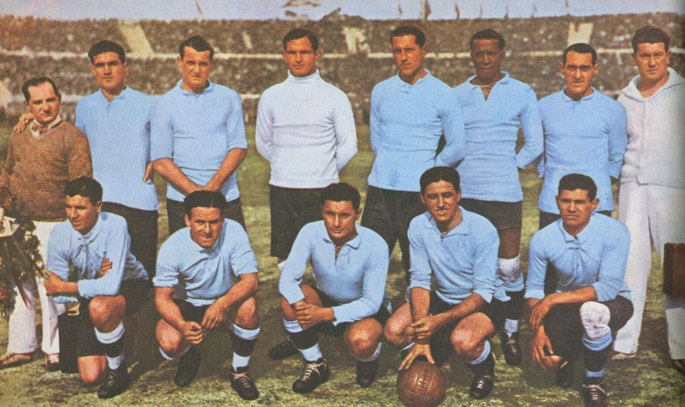
Due to the then success of Uruguay through the early 1900’s, Rimet, decided to reward the country by asking it to host the first official World Cup. Because of the logistics of getting to Uruguay, such as the cost and time it took to travel, many European nations were reluctant to send teams. However, Rimet was persistent and eventually managed to persuade 13 nations to join in the tournament including the European representatives of Belgium, France, Romania and Yugoslavia.
The World Cup tends to take place after the end of the professional European season in June/July. It usually lasts around 8 weeks in total. The fact that the World Cup has been awarded to Qatar in 2022 meant that tournament was moved to the winter months, mainly due to the extreme heat that will occur in the country in the usual June/July slot. This has come with much controversy due to it being in the midst of a lot of footballing national leagues such as our own Premier League.
Picking the Hosts

By Daniel, flickr
Those that wish to host the World Cup will ‘bid’ for the chance to do so, usually finding out if they’re successful several years before it begins. For a time, FIFA experimented with giving the World Cup to a federation before deciding upon the specific host nation from that Federation. For example, In 2010 it was awarded to Africa with South Africa eventually becoming the hosts, then in 2014 South America got the nod and Brazil was chosen as the host nation.
The winning nation used to be selected by a voting process from representatives within FIFA. However, moving forward FIFA have decided to scrap that process and from 2018 any country can bid to host the World Cup, provided that they aren’t the previous two representative nations. The main reason for changing the way the selection process works is that FIFA officials were accused of corruption in the way in which the host nation was selected, but there’ll be more information about that later.
The 2022 Hosts – Qatar
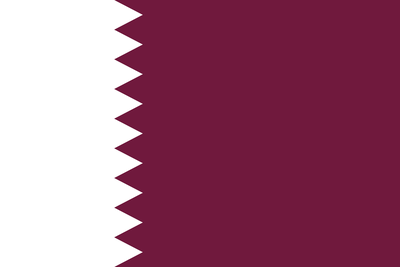
The next two hosts of the World Cups in 2022 and 2026 have already been decided. It was decided by FIFA that the 2018 and 2022 World Cups would be awarded at the same time, with the bidding process beginning in January of 2009. Australia, Japan, Qatar, South Korea and the United States were the nations that placed bids to host the 2022 World Cup, with the FIFA Executive Committee gathering on the second of December in 2010 to vote on which bid they wanted to be successful. Again, this will be covered in more detail later, but the vote to award the hosting of the tournament to Qatar was shrouded in accusations of corruption.
Such are the question marks around the idea of Qatar being awarded the World Cup in 2022 that it was thought possible that it might not take place. The head of FIFA’s Audit and Compliance Committee, Domenico Scala, confirmed in 2015 that the awarding would be cancelled if it was proven that votes for the nation were ‘bought’. FIFA’s decision has also come under criticism because of the human rights abuses within the country, including deaths of workers who are being used to build the stadiums. Amnesty International have referred to them as ‘forced labour’ even the drafting of workers’ welfare standards being drafted in 2014 hasn’t altered the lack of comfort around the matter.
The 2026 Hosts – U.S.A, Mexico & Canada
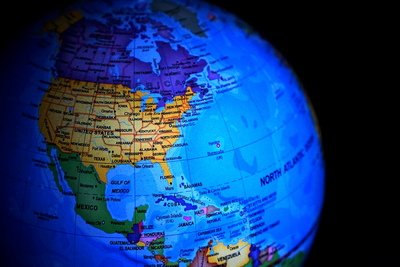
In 2018 it was confirmed that the winning bid for the 2026 World Cup was a joint one from the United States, Canada and Mexico. Having already hosted the 1970 and 1986 tournaments, Mexico will become the first nation to have hosted the competition three times.
The announcement came at a somewhat ironic time, with Donald Trump, the US President in 2018, being less than diplomatic in his attitude towards both Mexico and Canada. That led many to question the validity of the awarding of the tournament to the three nations. On top of that, the 2026 World Cup will also be the first to be expanded to include 48 teams rather than 32.
Allegations of Corruption at FIFA
There have been numerous controversies surrounding FIFA in recent years, with most of them having to do with the way in which World Cup hosts have been chosen. Such is the wide-ranging nature of corruption, it’s believed by some that almost no World Cup since the 1980s has been awarded to the host nation without some form of corruption in play.
As an example, in 2011 a member of the Qatar bidding team named Phaedra Al-Majid came forward and claimed that $1.5 million had been paid to three members of the voting panel from Africa named Issa Hayatou, Jacques Anouma and Amos Adamu as a persuasive measure to ‘convince’ them to award the 2022 World Cup to the nation.
That wasn’t the first example of corruption within FIFA’s ranks, however. Indeed, investigations into such behaviour first began in 2010 when American law enforcement were able to gain the cooperation of Chuck Blazer from the CONCACAF confederation. The suggestion was that both CONMEBOL and CONCACAF had been colluding with marketing executives over the marketing rights for World Cups and Copa América tournaments. The suggestion was that both bribery and money laundering had been taking place for years.
Qualification
Qualification for the World Cup is broken down into six different confederations made up of Africa, Asia, North and Central America and the Caribbean, South America, Oceania and Europe. Each confederation is assigned a certain number of places that will allow teams to qualify for the World Cup proper. The slots are handed out depending on the strength and quality for the countries within each confederation, with the stronger ones getting more slots.
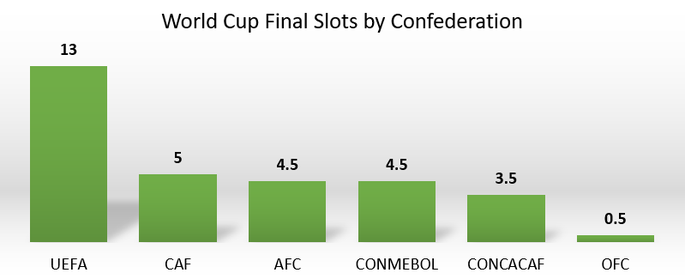
Teams then compete for those places that their confederation has been awarded, with the format for each qualifying stage varying for each confederation. It virtually always includes group stages, with the top performing teams then getting the nod to take part in the World Cup proper.
The World Cup Finals
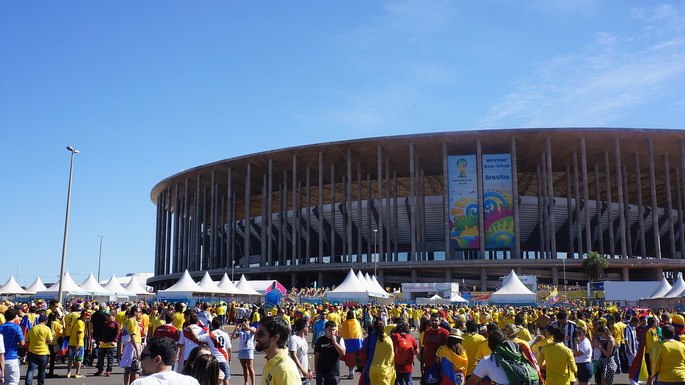
Once into the tournament itself, the 32 competing nations are again split up into groups of 4, consisting of 8 groups total. The top 2 teams from each group then go into the last 16, which is the knockout stage the World Cup. Which teams go up against each other depends on where they finished in the group, with the winners of one group taking on the runners-up of another. It’s not always beneficial to finish top of the group, therefore, as stronger teams can sometimes finish second in the other group that they’re drawn against and you can see some heavyweights going head-to-head early on.
After the last 16 matches the tournament then progresses to the quarter-finals, semi-finals and then the final itself. The two losers from the two semi-finals will then play out in a 3rd/4th place play-off game, before the final takes place the following day.
Expansion to 48 Teams
Interestingly, discussion about expanding the tournament further began as early as 2013. It was the brainchild of the then President of the organisation Sepp Blatter who felt that true globalisation of the sport could only happen when Asia and Africa were given the same number of places for the finals as Europe and the other major confederations. In January of 2017 it was confirmed that 48 teams would be able to take part in the World Cup from the 2026 edition onwards.
World Cup Awards
There are a number of awards that are given out when a World Cup has reached his conclusion. Here’s a look at the most popular ones:
| Award | Details |
|---|---|
| Golden Ball | The most impressive player throughout the tournament |
| Golden Boot | The top goal scorer throughout the World Cup |
| Golden Glove | The goalkeeper that keeps the most clean sheets during the finals |
| Best Young Player | The best performing player under the age of 21 (at the start of that year) |
| Fair Play Trophy | Team with the best disciplinary record, must reach the knockout stages |
There is also, of course, the Man of the Match Award that’s given out in every game of the tournament. This was first brought in in the 2002 World Cup and has remained in place ever since.
Sponsorship
As the World Cup grew in popularity and began to be watched in more and more countries around the globe, so too did the desire for companies to have their names associated with the tournament. It’s believed that close to $1 billion on sponsorship was generated in the build-up to the World Cup hosted by South Africa in 2010, with that figure jumping to more than $1.5 billion ahead of Brazil’s hosting of the tournament in 2014.
Intriguingly, that figure dropped in the run up to the World Cup in Russia in 2018. This was mostly due to the corruption scandal that had engulfed FIFA in the years before the tournament was due to get underway. Though the long-term companies such as Coca-Cola and Visa, which had sponsored the tournament for years, continued to do so, the organisation struggled to bring any new Partners on board. Only companies from either upcoming host countries, such as Russia and Qatar, or countries that hoped to host in the future, like China, became Partners in the run-up to the World Cup getting underway.
Football Innovations
The World Cup has often been used by FIFA as a way of introducing changes to the rules of football to the wider world, regardless of whether they are wanted or even have been properly tested.
Golden Goal & Silver Goal
The first example of this came about with the 1998 World Cup when the ‘Golden Goal’ rule was used for the first time in a FIFA organised tournament. This method of deciding tied games was entirely unpopular with the wide footballing world, having been used by confederations before the World Cup with mixed success.
The idea behind the rule was that a goal scored during extra-time would end the match immediately, rewarding the team that scored it with the victory and seeing the other side knocked out of the competition. Laurent Blanc scored a goal for France against Uruguay in their last 16 match, becoming the first player to score a Golden Goal in a World Cup finals. It was used in the 2002 World Cup and then abandoned, despite FIFA’s attempts to keep the idea alive with the introduction of the Silver Goal in 2002.
There were numerous reasons as to why the idea of the Golden Goal was considered to be a failed experiment, not least of which was the fact that confederations could choose which version of extra-time to use in their own tournaments, leading to some confusion. It also wasn’t implemented particularly well, with the organisers of the 1994 Caribbean Cup deciding that Golden Goals would count double for goal difference in qualifying games. During a match between Barbados and Grenada, the former needed two goals to proceed but were only 2-1 up with moments of the match remaining. They scored an own goal, forcing the game into extra-time and then scored a Golden Goal in that period, progressing to the next round as a result.
Video Assistant Referee (VAR)
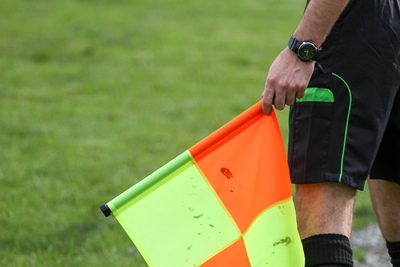
This attempt to introduce changes to the game is perhaps best illustrated by FIFA’s decision to use the Video Assistant Referee system for the World Cup in 2018. In a 2016 annual meeting of the International Football Association Board, which is the governing body that decides which rules should or should not be introduced to the game, it was decided that a trial period for the new technology should take place in the following year. Reserve Major League Soccer teams were the first to use VAR before international friendlies began to introduce it.
Though it was generally perceived to have worked well by most in the early stages of its use, few referees were properly trained on how it worked and some confusion still existed. It had barely been used in true competitive environments before FIFA chose to introduce it in time for the 2018 World Cup, which is reflected in the fact that the first training school for working with a Video Assistant Referee didn’t come about until one was opened in Italy in January of 2018. In March of the same year, just three months before the tournament was due to get underway in Russia, FIFA confirmed that it would be in use in all matches on the back of IFAB’s decision to write it into the rule book on the understanding that each competition’s organisers could choose whether or not to use it.
It would be untrue to suggest that the use of VAR in the 2018 World Cup was widely applauded. The first penalty given thanks to the use of the system was in a group match between Australia and France, during which Australia’s Josh Risdon slid in on Antoine Griezmann but failed to get the ball. The referee thought he did and so waved play-on, but the Video Assistant Referee told him to review it and a penalty was awarded. Part of the problem of the acceptance of VAR in the tournament was that pundits and commentators didn’t understand how it was being used or what it was being used for, leading to confusion over incidents such as that one. Nevertheless, it was felt that more correct decisions were made.
World Cup Facts and Figures
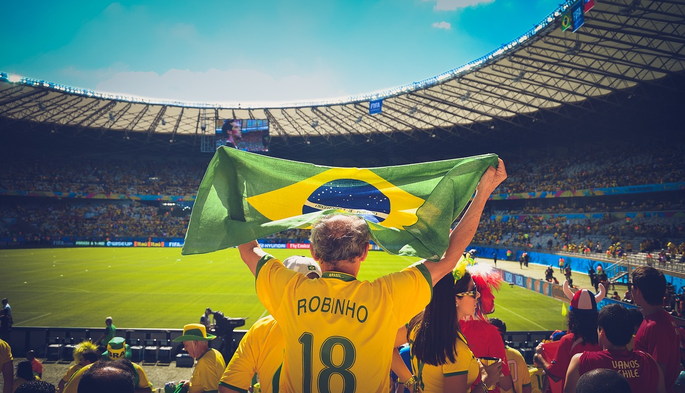
The most successful team in World Cup history is Brazil, having won the tournament more than any other. The Brazilians have also appeared in every World Cup since the original one in 1930, being the only nation to do so. On top of that, Italy and Brazil are the only countries that have managed to win back-to-back World Cups, which they did in 1934/1938 and then 1958/1962 respectively.
Germany are widely considered to be one of the best World Cup sides of all time, mainly because of the fact that they constantly seem to be in finals. Whilst that’s true, they’re also one of the unluckiest sides in that they’ve been losing finalists on four occasions to date. When the nation was known as West Germany they were involved in the first game in which a red card was shown when Carlos Caszely was sent off for Chile in a game against the European side.
There are countless interesting goal facts from World Cups over the years, which you can read some of here:
- Highest scoring qualifying game: Australia 31 – American Samoa 0 (2001)
- Highest scoring finals match: Austria 7 – Switzerland 5 (1954)
- Most goals scored by a team: 10 (Hungary v El Salvador in 1982)
- Most goals scored by a player in 1 game: 5 (Oleg Salenko for Russia in 1994)
- Fastest goal: 11 seconds (Hakan Sukur for Turkey in 2002)
- Most goals scored by a player in a tournament: 13 (Just Fontaine for France)
- Oldest World Cup Finals goalscorer: Roger Milla (42 in 1994)
- Youngest World Cup Finals goalscorer: Pele (17 in 1958)
- Scored In Every Match in a Tournament: Jairzinho in 1970
Though those facts are all to do with goalscoring exploits, there are many other interesting ones beside. As an example, it’s estimated that about 3.2 billion people, or 46% of the world’s population, tune in to watch the World Cup. That’s especially exciting for host nations, where the birth rate tends to rise by 10% in the weeks that follow the tournament’s conclusion. At the time of writing, Italy’s Vittorio Pozzo remains the most successful manager, having led his nation to World Cup titles on two separate occasions.
